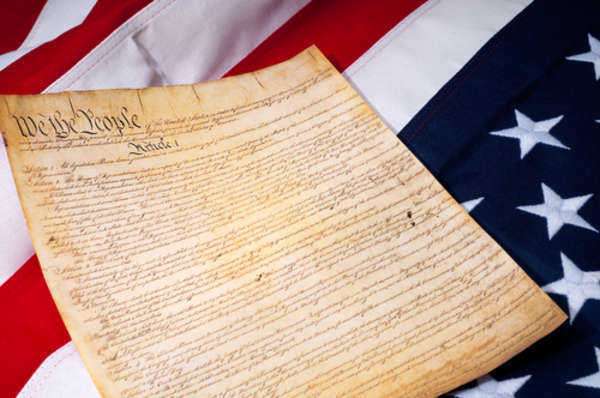Who Wrote the Constitution?
Who Wrote the Constitution? A Collective Effort for National Unity
Introduction:
The Constitution of a nation is a fundamental document that outlines the principles, laws, and framework upon which a government is established. In the case of the United States, its Constitution holds immense historical significance as it serves as the bedrock of the nation's democratic system. However, pinpointing a single author of the Constitution is not possible, as it was a collaborative effort led by a group of remarkable individuals known as the Founding Fathers.
The Founding Fathers:

The drafting of the Constitution was preceded by the American Revolutionary War, during which the thirteen colonies fought for their independence from British rule. As the war concluded, it became apparent that a unified governmental structure was essential for the young nation's stability and progress.
The Founding Fathers, a group of exceptional visionaries and leaders, emerged during this critical period. They included figures like George Washington, Thomas Jefferson, John Adams, James Madison, Benjamin Franklin, and many others. These men possessed extensive knowledge of political theory, experience in governance, and a deep commitment to creating a fair and just society.
The Constitutional Convention:
The Constitutional Convention, held in Philadelphia in 1787, brought together these distinguished voices to deliberate and create a new framework for governing America. Although George Washington presided over the convention, the process of crafting the Constitution was a collective endeavor involving numerous delegates representing different states.
The Collaborative Process:
While it is true that some individuals played prominent roles in shaping specific parts of the Constitution, such as James Madison, often referred to as the "Father of the Constitution," one must remember that the final document was a result of compromise and collaboration.
The Founding Fathers engaged in intense debates and discussions regarding various aspects of the Constitution, including the division of powers between the federal and state governments, representation, and individual rights. Each delegate brought forth their experience, ideas, and concerns, allowing for a comprehensive approach to constitution-making.
Incorporating Influential Documents:
To create a well-rounded and informed framework, the Founding Fathers drew inspiration from several influential documents. The Magna Carta, English Bill of Rights, and various state constitutions all served as references during the drafting process. By studying different forms of government and legal systems, the Founders were able to extract valuable insights that would shape the American Constitution.
Legacy and Significance:
The enduring nature of the U.S. Constitution is a testament to the wisdom and foresight of the Founding Fathers. Their commitment to democratic principles, individual rights, and the separation of powers has created a system that has withstood the test of time.
Furthermore, the Constitution continues to be a living document, subject to interpretation and amendment in response to societal changes. This enduring quality, combined with the spirit of collaboration that characterized its creation, exemplifies how the Founding Fathers sought to establish a nation rooted in democratic ideals while embracing the flexibility required for progress and growth.
Conclusion:
Identifying a singular author of the United States Constitution would oversimplify and undermine the true essence of its creation. The document is the product of a collective effort by a group of remarkable individuals known as the Founding Fathers. Their dedication, intellect, and willingness to compromise allowed for the creation of a framework that has served as the foundation of American democracy for over two centuries. The Constitution represents the triumph of unity over individual ambition, highlighting the power of collaboration and compromise in achieving a common goal.
The signers of the Constitution are considered to be a collection of the greatest political and philosophical minds in the United States. The very thought of attendees of the Constitutional Convention - George Washington, John Adams, and Ben Franklin, just to name a few - collected in a single room while deciding the fate of a new country is staggering.
The brilliance of the signers of the Constitution is only second to the bravery displayed by them. Unwilling to recreate the tyranny of the British monarchy and refusing to indulge in the reactionary whims of the Articles of Confederation, the Founding Fathers both authored and promulgated a political document that is considered to be the forefront of revolutionary, democratic political thought. Comprised of Federalists, nationalists, and patriots, the signers of the Constitution had not only witnessed the overthrowing of a tyrannical ruling body, but many of them also had a direct hand in this process.
· George Washington, the appointed head of the Constitutional Convention, was the leader of the Continental Army responsible for defeating the British troops, and as a result, removing the presence of King George and the British monarchy as the ruling body of the thirteen colonies, which soon-after became the United States.
·. Along with Alexander Hamilton and John Jay, all three men are credited with the authorship of the Federalist Papers.
· Alexander Hamilton was not only a renowned political thinker responsible for the primary authorship of the Federalist
Papers, but also served as an Assistant General under George Washington in the Revolutionary War.
· Benjamin Franklin was a respected author and Federalist who, aside from his political acumen, is considered to be an
accomplished inventor, credited with the invention of the lightning rod and bifocals.
·. He is renowned for his refusal to sign the Constitution due to the absence of a clause that would allow for amendments - coincidentally, this clause would later be defined as the Bill of Rights. He, alongside his fellow Virginia delegates, had unanimously abstained from signing the Constitution until 5 months following its ratification. The State of Rhode Island joined in that abstaining as well.
Those who were not present as signers of the Constitution were Thomas Jefferson and John Adams. They were both in Europe at the time on diplomatic assignments.